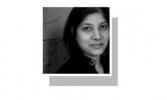A trusted space
AT a recent anti-corruption conference, I briefly chatted with a Bolivian gentleman who is both an activist fighting corruption and convener of a network of librarians. My first instinct was to dismiss his involvement with libraries as an interesting hobby. But shortly after our encounter, it clicked: public access to information is the bedrock of anti-corruption, so why wouldn’t the activist wear both hats?
I am not alone in forgetting the democratic underpinning of libraries. Due to their growing rarity, we tend to consider them ends unto themselves. They are sometimes treated like artefacts rather than civic spaces, the books inside reframed as relics from a literate past that must be preserved rather than sources of information that should be consumed, considered, challenged.
Often, our public discourse curtails libraries to their educative role — quiet places, typically on campuses, where students can use reference books or work without interruption. This is a critical function, but it misses the wood for the trees.
In a democratic context, libraries are places where citizens can access information that helps them make informed decisions about who to vote for, and that empowers them to hold those elected representatives to........
© Dawn





















 Toi Staff
Toi Staff Belen Fernandez
Belen Fernandez Andrew Mitrovica
Andrew Mitrovica Gideon Levy
Gideon Levy Tarik Cyril Amar
Tarik Cyril Amar Rachel Marsden
Rachel Marsden Warren J. Blumenfeld
Warren J. Blumenfeld Dr Ramzy Baroud
Dr Ramzy Baroud Tafi Mhaka
Tafi Mhaka Adam Makary
Adam Makary
